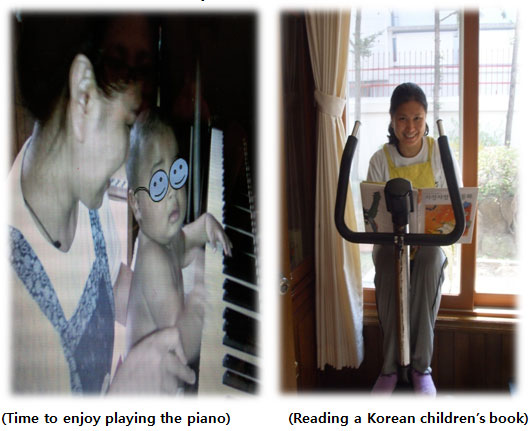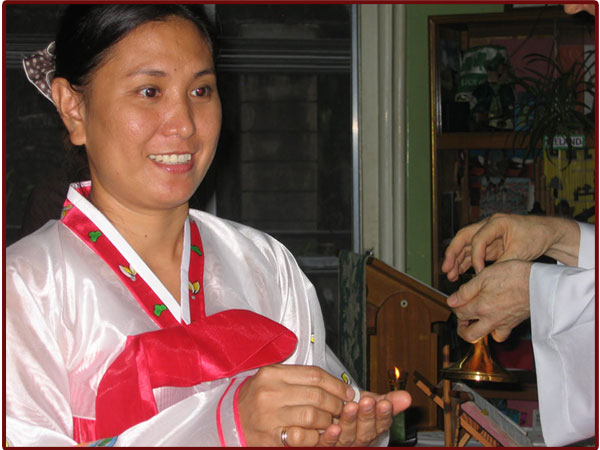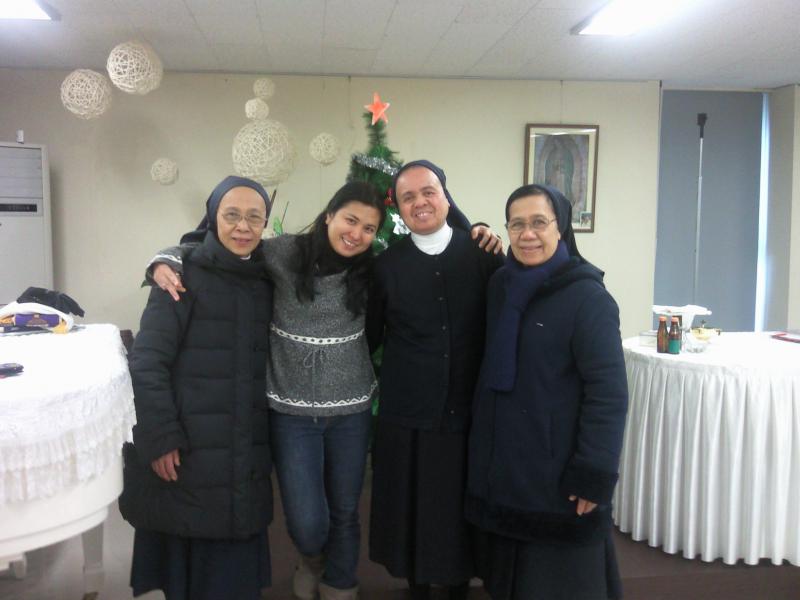When I pray the Our Father
By Maira San Juan
Maira San Juan is from Taytay, Rizal, near Manila, and worked as a Columban Lay Missionary in Korea from 2007 till the end of 2012.
It’s been five years since I arrived in Korea as a Columban Lay Missionary from the Philippines. Since my nine months of language study I have been immersed in ministry with a community of persons with AIDS. On my first day there I felt a mixture of excitement and fear: excitement because it was my first time meeting people living with HIV and I was curious to know how they were coping after learning that they were HIV-positive; fear because at the back of my mind I was thinking I might get the HIV virus through them since we ate at the same table, used the same toilet, talked to each other and so on. But through the years I have been with them, my thinking and feelings have changed, not only about them but also about life, about people, about me and about God. Being a missionary involved in AIDS ministry has helped me to grow not only as a person but also as a woman called by God to be a part of his mission. Throughout my journey, the prayer that has helped me and acquired a new personal meaning is the Lord’s Prayer.
Our Father, who art in Heaven, hallowed be thy name
I grew up in an environment where most people were Catholics. But in Korea most have a different religion from me and have no idea what a Lay Missionary is. There was a time when I chose not to say that I’m a Lay Missionary, not because I had a problem with the term but because I had a hard time trying to explain it. Not only did the Koreans have difficulties understanding the term ‘Lay Missionary’ but so did most of the Filipino migrants I met. The first thing that came to their mind was that either I was a religious or a migrant worker with a missionary visa.
Maira, left, with Losena Biau Duvuwale, a Columban Lay Missionary from Fiji.
At first this made me sad. I felt that Lay Missionaries had no identity of their own, which really frustrated me. When I began to question my frustration, I found deep in my heart a tendency to be attached to a title that can put me on a pedestal. This awareness helped me to remind myself that every time I think of myself as a lay missionary it is through God’s grace and trust that I became an instrument of His love. And because of this it is He who is to be glorified. Whenever someone calls me ‘missionary’ it is not me they recognize but the One who called me on mission.
Thy kingdom come,
thy will be done on earth as it is in heaven
Sometimes I accompany members of the community to hospital. Sometimes I visit communities of migrants and give information about HIV. But most of the time I’m in the community doing household chores. During my first year I experienced confusion because every day I was doing the same chores: cleaning, cooking, and attending to the needs of the patients. I asked myself, ‘What am I doing here? I’m a missionary, not a migrant worker, so why am I cleaning toilets?’ I was so attached to the word ‘missionary’. Time went by and nothing changed. I was still cleaning toilets, doing household chores, doing the laundry. When I got tired of being idealistic about my title as a ‘missionary’ I asked myself again, ‘What am I doing here?’ Then I realized that that is where God helps me to grow.
Some in the community have passed away. Some are now living to the best of their abilities away from the community. In the community people are always coming and going. Many new patients stay only for a short while. When an HIV-positive mother with a newly born baby stayed there was a different dynamic. The presence of the baby gave more life to the community. We were so thankful when the baby’s test result was negative; he was HIV-free.

Then another woman came with a baby who was HIV-positive. I was so happy when the baby arrived. I didn’t felt sorry for him because what I saw was a beautiful healthy baby. When his mother started to give him medicine everyday he would struggle and cry a lot. That was when I felt sorry for him. His tiny body was receiving a lot of strong medicine that he would have to take for the rest of his life.
That was also the time I asked God, ‘If you love your children so much why do you let this one have HIV?’ God didn’t answer. But I was reminded that I’m only a human being, frustrated in not knowing all the things hidden from me. Born with the gift of free will, I can choose and make my own decisions but have no control over the outcome, which means I have no control over things that happen to other people. And I have no idea what God’s plan for them is. Even though He hasn’t answered me, because of all the past experiences in my life, there is one truth I always keep in my heart: God never abandons His children.

Give us this day our daily bread
Every morning when I open my eyes, the first thought I always have is, ‘I’m not dead!’ Then I say, ‘Thank you God I’m still alive’ followed by the question ‘But why?’ Then little by little I have started to understand that in His grace I always wake up in the morning, and am able to witness the lives of the patients in the community and see the hope in their eyes and I receive a beautiful smile from our beautiful baby, snack foods from patients so willing to share, help from patients who have the energy to participate in household chores, beautiful compliments from patients who never get tired of saying positive things about me.
Then I consider the patients and ask myself how they feel when they wake up. I wonder how they react knowing that they are alive for another day. Are they questioning their continued existence or do they just accept that they are alive but not feeling anything? I’m happy every time I see them in the community gaining their health and energy. But sometimes I feel sorry for them because they need to always take their HIV medicine even when they are tired of taking it. And sometimes because of depression they just stay in their rooms sleeping or hardly talk. Some go out only if it’s their schedule to go to the hospital, because most spend their time in their rooms or watching television.
Then I say to myself, ‘They have a hard life but they still choose not to give up on it’. And every time I witness this it nurtures me and renews my strength to face the new day.
Columban Sister Miriam Cousins and Maira.
Sometimes seeing them at their lowest point makes me so helpless because there is nothing I can do to ease their suffering. This reminds me that all of us have a hunger in our soul that cannot be satisfied. Yes, the community can provide them with a place to stay, food to ease their physical hunger, friendship that can make them feel welcome, but it is still not enough to ease the pain of their own suffering. This has helped me to acknowledge that letting other people experience their own pain makes them discover in their own heart a hope that is continuously flowing from the strength of their own soul. And that’s what nurtures them every day and gives them a reason to face a new day. This is the most important grace every person can receive.
And forgive us our trespasses,
as we forgive those who trespass against us;
and lead us not into temptation,
but deliver us from evil
A continual struggle for me was accepting gifts from patients in the community, not because I’m not comfortable with receiving but because I’m thinking about other patients who have no means to buy things. And I also wondered if patients who gave expected something in return. When they really insist, I receive their simple tokens but always with some hesitation. Sometimes I confuse myself with the way I respond because when I try to see it from their perspective, I see a simple gesture of gratitude for helping them and I see nothing wrong with that. Even when I see it this way I have this feeling that it’s not right. Because of it I try to deny them the opportunity to give me gifts.
But sometimes this results in misunderstandings. Every time they would like to give me something I say ‘no’. When they don’t acknowledge my response and kept insisting I feel hurt and angry because I think that they have crossed a line. But every time I feel like this I don’t say anything. I just ask another person to be a mediator so that the patient will know what I feel, because I can’t say to their face that I’m angry.
Columban lay missionaries Losena and Maira.
And that’s where I have learned to forgive them for hurting my feelings and also to forgive myself for not being brave enough to tell them personally. I’m continually learning from this.
I know that every time I say ‘no’ to their kind gesture I hurt them. But it doesn’t mean that I don’t care or don’t recognize their effort, for I know that they appreciate what I’m doing. It’s always easy to say ‘yes’ because it means not offending others. And it’s really easy to just open my hands and receive everything they give because they are so generous. But I can’t do that. I can’t explain my personal reason to them because it’s rooted in my own beliefs and it is also important for me to protect what I believe in.
Amen.

Maira with, left to right, Sr Jesusa D. Villaverde SJBP, (Sisters of Jesus Good Shepherd ‘Pastorelle’), Sr Ester Cecilia DC and Sr Lucia Diasnes DC (Daughters of Charity of St Vincent de Paul). All are from the Philippines.
You may email the author at mesaj85@yahoo.com
